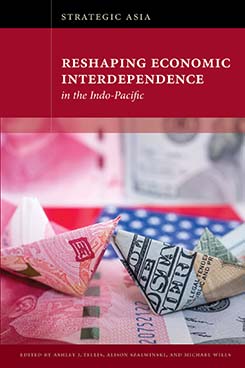U.S.-China Economic Rivalry in Southeast Asia and Its Implications
This chapter examines how Southeast Asian economies have been affected by U.S.-China rivalry, how the region’s economic policies have responded, and how the U.S. should reconsider its economic policies toward the region.
EXECUTIVE SUMMARY
MAIN ARGUMENT
Southeast Asia has experienced transformative economic growth, driven by its embrace of globalization. Although the U.S. is the region’s largest source of FDI, China has become the region’s preeminent economic power by becoming its largest trading partner and external official creditor. So far, U.S.-China economic rivalry appears to have benefited Southeast Asia. Both countries have increased their trade with the region, compete to provide development finance, and permit broad access to new technologies. Southeast Asian countries have hedged their economic relations between the U.S. and China. While they look to China to further economic interests, they look to the U.S. for security against China’s aggressive posture in the South China Sea and possible use of economic coercion. The U.S. needs to overhaul its agenda of economic engagement in Southeast Asia if it is to shape the region’s rules and norms of international economic relations for the 21st century. Urgently needed are greater strategic coherence in its economic assistance programs and improved program effectiveness through more, and more sustained, government funding.
POLICY IMPLICATIONS
- For greater strategic coherence, the U.S. could make the Indo-Pacific Economic Framework (IPEF) its central vehicle for economic engagement with the region, use the IPEF’s trade pillar as a stepping stone to reach a 21st-century trade agreement with Southeast Asia, and make human capital, climate change, and infrastructure signature elements within the IPEF.
- For greater program effectiveness, the U.S. needs to provide increased multiyear fiscal support for bilateral assistance, leverage its bilateral support through multilateral initiatives, and reconsider its position on membership in the Asian Infrastructure Investment Bank.
Vikram Nehru is a Senior Fellow at the Foreign Policy Institute, Johns Hopkins University School of Advanced International Studies.
Strategic Asia
The Strategic Asia annual edited volume incorporates assessments of economic, political, and military trends and focuses on the strategies that drive policy in the region. Learn more about Strategic Asia.



